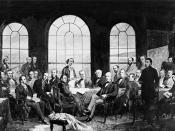The Pressures Leading to Confederation The confederation of British North America was achieved through both internal and external pressures. B.N.A. had political problems which lead them to confederation, they were also pushed into confederation by the termination of the reciprocity treaty.
There were political problems in B.N.A. which lead them into confederation, the current system of government wasn't working and they couldn't keep it. Lower Canada felt that they didn't have enough say and that their culture wasn't being represented There were problems between upper and lower Canada. They wanted to build a railroad system and confederation could do this. The pressures did not only come from within B.N.A, there were also external reasons for confederation.
The external reasons for confederation were more influential than the internal reasons. B.N.A. was afraid that they would be absorbed by the U.S, and their idea of manifest destiny. B.N.A. felt that the could better defend themselves if they were a union.
Another problem was the U.S.'s termination of the reciprocity treaty, if B.N.A. were a union they could trade within each other and would not have to pay for trade. B.N.A. was afraid of the Finian raids which used B.N.A. as a base to attack Ireland, B.N.A. thought they could defend them against these raids. Britain felt that they should no longer be responsible for the defence of B.N.A., B.N.A. felt they could defend themselves better as a union if Br. were to stop defending B.N.A.
The pressures both internal and external on B.N.A. lead to a federal union


